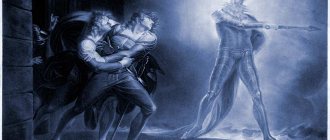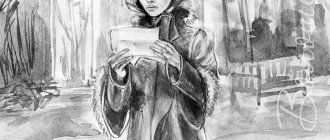- Summary
- /
- Leskov
- /
- Toupee artist
Year: 1883 Genre: story
Main characters: serfs Arkady and Lyubov
The story “The Stupid Artist” was written for a reason. Its writing was preceded by a story by the nanny of Leskov’s younger brother, who in the past was an actress of the Oryol theater. On Trinity Sunday she takes the author to the cemetery and there, at an ordinary grave, she tells the story of the “stupid artist” Arkady.
The main idea of “The Stupid Artist” is that Nikolai Leskov, using an epigraph in the Church Slavonic language, “Their souls will dwell in the good,” emphasizes that the souls will be among the righteous. Thus, he carries out the main idea of the work as a red thread.
Read the summary The Stupid Artist chapter by chapter (Leskov)
Chapter 1
The reader understands that in Russia an “artist” is a painter or sculptor. But at the end of the chapter it is explained that the “artist” is a craftsman who gives a pleasant expression to the faces of the deceased. It turns out that somewhere in Russia there lived one of these.
Chapter 2
Nikolai Leskov had a younger brother. My brother had a nanny - a former actress of the Oryol theater. She loved tragedy in life and sometimes she took to drinking because of this awareness. Often the nanny took the Leskov brothers for a walk in the cemetery, they always stopped at one simple grave, and the nanny told them the story of the toupee artist (in the modern style of a hairdresser.).
Chapter 3
The toupee artist's name was Arkady. He served in the theater together with the Leskovs' nanny. They spoke of him as a master of his craft.
The owners of the theater were the Kamensky brothers. There were three of them. They were spoken of as tyrants of their serfs. It is not precisely named under which of the brothers the events described in the story took place. Nanny always looked at the ruins of the count's estate with fear and hatred.
Chapter 4
Arkady is a skilled hairdresser with a proud and independent character. Despite such character traits, the master-count valued his subordinate. To prevent someone from luring him away, Arkady was kept locked up and was not even allowed to go to church.
Arkady fell in love with Lyuba (the Leskovs' nanny). The feeling was mutual. But the young people did not have the opportunity to meet and be together, because all the actresses were kept under strict supervision.
Chapter 5
The Tsar himself is in Orel. On this occasion, Kamensky gathers the entire upper class of the city in the theater. The main actress was injured by a falling curtain and is unable to play the role. Then Lyuba is introduced as a replacement. The Count is not against castling and orders that Camarina earrings be given to the new leading lady.
Camarina earrings from the count meant that the girl must give her virginity to the count. Arkady was cleaning up the actresses for the performance. He was ordered to remove Lyuba beautifully. Lyuba, seeing the mosquito earrings, just cried bitterly.
Chapter 6
On the occasion of the sovereign's visit, the count's brother came to Oryol. He was awkward in appearance. He was ashamed to go out to important gentlemen.
Chapter 7
When the count's brother lived in the village, he did not shave and did not take care of his appearance. In Orel, he gathered all the barbers and said that he would pay two gold pieces to the one who cut his hair well or kill the one who cut his hair poorly. None of the barbers in the city of Orel agreed to such conditions. Then the count's brother persuaded his relative to allow Arkady to manipulate his appearance.
Chapter 8
The count invited Arkady to his place and ordered him to trim the claws of his brother's poodle. After that, he had to remove Lyuba as Cecilia. Hearing this statement, Arkady turned pale, because he loved Lyuba.
Chapter 9
Arkady came to the count and tonsured him without making a single cut. Then Arkady went to clean up Lyubushka. And he quietly whispered in her ear that he would take her away.
Chapter 10
The performance ended with success. Arkady's words were apparently retold to Count Kamensky. The count's brother advised to be afraid of Arkady when he shaves with a razor. The Count just grinned.
Chapter 11
After the performance, Lyuba was stripped of her stage costume and dressed up as Cecilia. Arkady came to make her look innocent and virginal.
Near the room where Arkady was preening Lyuba, six people were already standing to grab her and drag her to the count for abuse.
But Arkady, as soon as he entered Lyubushka’s place, grabbed the table, broke the window and jumped out of it with the girl in his arms.
Lyuba came to her senses when they were already galloping in a troika and running away from pursuit. They crossed the river and entered the village. Arkady assured Lyuba that in this village there lived a priest who performed “desperate weddings.” They went to such a priest.
Chapter 12
The priest opened the door for them. Arkady told him about his misadventures. Because of the priest’s greed, they agreed to spend the night for six ducats and kamarino earrings. We had just agreed when there was a knock on the door.
Chapter 13
The priest hid the fugitives: Arkady under a feather bed, and Lyuba in a watch case. And the front wall of the case was cut out a little so that it could be seen.
8 people from Kamensky’s people entered the room. The priest was at first confused and began to say that he had not seen the fugitives. But he showed with gestures where the fugitives were. First they pulled Lyuba out of the case, and then Arkady himself crawled out of the shelter. He took the blame upon himself and spat in the faces of the count's minions. Arkady was tied up, and Lyuba was tied up in a sleigh and back to the count.
Chapter 14
Lyuba was brought to the count. He took her virginity. Afterwards she returned to her little room and heard screams and moans - that Arkady was being tortured. Lyuba wanted to hang herself on her own spit, but lost consciousness. When the girl came to her senses, she felt that the calves were licking her, and there was an affectionate woman nearby. It turned out that Lyuba was demoted from the actresses and kicked out to the calf barn.
Chapter 15
Lyuba learned that the kind woman's name was Drosida. She told Lyuba her difficult story. She said that she drinks from such a life. Lyuba noticed that Drosida was gray-haired.
The count sent Arkady into the army as a regimental sergeant.
Lyuba lived with the calves for three years. And every night she dreamed of Arkady. She got used to this kind of life. One evening, someone threw a stone wrapped in a piece of paper through the window.
Chapter 16
It turned out that this note was from Arkady.
Chapter 17
Arkady wrote that in the war he proved his status as an officer with blood. Now I’m on vacation for treatment. That he was given 500 rubles for his injuries, and he wants to use this money to buy Lyuba from the serfs from the count.
Chapter 18
Morning has come. Lyuba sees that the crowd is running somewhere. I started asking what happened. She was told that in the settlement a janitor stabbed a sleepy officer and stole 500 rubles from him. As soon as Lyuba heard this, she lost her feelings. Arkady was buried. This is the very grave where she took the Leskov brothers for a walk.
Chapter 19
Even the governor himself was at Arkady's funeral. The murderer was whipped in the square. When Lyuba came from the funeral, Drosida told her to cry. I also gave her something to drink. From then on, Lyuba began to sip on a glass.
Rate this piece:
- 3.13
Votes: 75
Read summary Stupid artist. Brief retelling. For a reader's diary, take 5-6 sentences
Brief history of creation
“The Stupid Artist” was first published in 1883 in the “Art Magazine with an Art Album Supplement,” an unimportant publication intended more for art lovers than for literature fans. The publication was accompanied by the note “St. Petersburg, February 19, 1883. Day of liberation of serfs and Saturday of “remembrance of the dead.” The work contains autobiographical moments related to Leskov’s childhood. At the same time, the writer’s son noted that the narrator in “The Stupid Artist” – Lyubov Onisimovna – might not have had anything to do with the Leskov family.
Leskov. Brief summaries of works
- Pearl necklace
- Sealed Angel
- Beast
- Cadet Monastery
- Lion of Elder Gerasim
- Lefty briefly and chapter by chapter
- Lady Macbeth of Mtsensk
- On the edge of the world
- Non-lethal head
- Deception
- One-minded
- The Enchanted Wanderer
- Ghost in the engineering castle
- Scarecrow
- Old genius
- Toupee artist
- Christ visiting a man
- Man on the clock
Main characters
Lyubov Onisimovna is an old woman, a former actress of the serf theater. The girl's beauty faded after an unsuccessful escape with her loved one (Arkady) and a suicide attempt. Having learned about Arkady's death, Lyubov Onisimovna began to “drown her grief” with vodka and put an end to her life.
Arkady Ilyich - “stupid artist”, a talented hairdresser and make-up artist at the serf theater; lover of Lyubov Onisimovna, who made an unsuccessful attempt to take her away from her owner. Arkady was sent to serve as a soldier and was able to distinguish himself in the war. When he returned, he was going to ransom his beloved, but was stabbed to death and robbed.
The image and characteristics of Arkady in the story “The Stupid Artist” by Leskov: description in quotes
| Artist Yu. Petrov |
The image and characteristics of Arkady in the story “The Stupid Artist” by Leskov: description in quotes
“. everything that I will tell further also happened in Orel. “
“. he was a “stupid artist,” that is, a hairdresser and make-up artist, who “drew and combed” all the serf artists of the count.”
“This was the cursed estate of Count Kamensky; there was also a theater right there.”
“But this was not a simple, banal master with a toupee comb behind his ear and a tin of rouge ground in lard, but this was a man with ideas - in a word, an artist.
According to Lyubov Onisimovna, no one could “do better than him in the face of imagination.” (*toupee comb - comb)
“The main feature of this artist’s make-up touch was his ideological nature, thanks to which he could give faces the most subtle and varied expressions.”
“. the services of such an inimitable artist as Arkady. “
“And he was already over twenty-five years old then. “
“And at this time he himself was more beautiful than any handsome man, because he was of moderate height, but slender, it’s impossible to say, his nose was thin and proud, and his eyes were angelic, kind, and his thick crest hung beautifully from his head over his eyes, so he looked , it happened as if from behind a foggy cloud. In a word, the toupee artist was handsome and “everyone liked him.”
“. about the dumbass Arkady, a sensitive and brave young man. “
“The Count himself also loved him and “distinguished him from everyone else, dressed him charmingly, but kept him in the greatest severity.” There was no way Arkady wanted anyone else to cut his hair, shave his hair, and comb his hair, and for this purpose he always kept him in his dressing room, and, except to the theater, Arkady had no way out. He was not even allowed into church for confession or communion. “
“And so, so that no one could use the services of such an inimitable artist as Arkady, he sat “his entire life without graduation and had never seen money in his hands.”
“. I swore an oath that Arkashka, as long as I am alive, will not clean up anyone but me.” (here “clean up” means hair, make-up, etc.)
“They, of course, knew each other, and they formed what happens in such years, that is, they fell in love with each other. But they could not talk about their love except in distant hints in front of everyone, during make-up. Dating face to face was completely impossible and even unthinkable. “
After an unsuccessful escape, the count sends Arkady to war as a soldier. In the army, the toupee artist receives an officer rank and a title of nobility. He comes on vacation to his native estate to redeem Lyubov from serfdom and marry her:
“My faithful Lyuba! I fought and served the sovereign and shed my blood more than once, and for that I received the rank of officer and a noble title. Now I have come free on leave to heal my wounds and stayed in Pushkarskaya Sloboda at an inn with a janitor, and tomorrow I will put on orders and crosses and go to the count and bring all my money that was given to me for treatment, five hundred rubles, and I will ask for to ransom you, and in the hope that we will get married before the throne of the Almighty Creator. “
“. he is now an officer, and with crosses and wounds. “
“This,” he says, “they are going to see how in the Pushkarskaya settlement an inn janitor stabbed a sleepy officer to death at night. Completely,” he says, “he caught his throat and took five hundred rubles of money from him.”
“Who buried the famous toupee artist here?
- The governor, my dear, the governor himself was at the funeral. Why! The officer, - both the deacon and the priest called him “Bolyarin” Arkady at mass, and as the coffin was lowered, the soldiers fired empty charges from their guns.”
“. and they buried him right here, in this very grave where we are sitting. Yes, here he is now, beneath us, beneath this little land. And then you thought, why do I keep coming here for a walk with you? “
This was a quotation image and characterization of Arkady in the story “The Stupid Artist” by Leskov: a description of the appearance, character and fate of the hero.
Composition
“The Stupid Artist” is a story within a story. The first chapter is an introduction from the author, in which he talks about artists. The main part is the story of Lyubov Onisimovna, told by herself. Sometimes her narration is interrupted by the author, since the nanny might not remember everything and might not know everything. For example, it is unlikely that she herself heard the conversation between the Kamensky brothers. At the end of the last chapter there is a short conclusion. In it, the author says that “as now” he sees and hears Lyubov Onisimovna. He tells how the nanny got up at night and kissed the “little cry”, remembering Arkady.
Main themes
The key theme of the story, which is often found in other works of Leskov, is the theme of righteousness. According to Ozhegov’s dictionary, a righteous person among believers is “a person who lives a righteous life and has no sins.” Lyubov Onisimovna and Arkady are people with a pure soul and conscience, true righteous people. Pay attention to an important detail - when they ran away from the count, the first thing they wanted was to get married, that is, to testify to their union before God.
It is no coincidence that the story also mentions the Catholic Saint Cecilia, a virgin martyr who suffered for the Christian faith. Like her, Lyubov Onisimovna suffered for her beliefs - she did not want to spend the night with the unloved Count Kamensky, tried to commit suicide to avoid this, and was eventually declared insane. By the way, the story does not directly say this, but it is very likely that the main character of “The Stupid Artist” never got married, remaining forever faithful to Arkady.
The theme of serfdom occupies an important place in the work. Count Kamensky, the owner of the theater, appears as a cruel man. Lyubov Onisimovna talks about the abuse his serfs were subjected to. For example, the count had cellars where people sat on chains. Some remained in this position for the rest of their lives. In addition, Kamensky tortured serfs. In particular, the rack was used. It wasn’t just the count’s people who suffered. One day he set dogs on the priests.
It is interesting that for all Kamensky’s cruelty, he has concepts of nobility, albeit peculiar ones. Yes, the count tortured Arkady after his escape, but then did not kill him or put him on a chain in the cellar. Kamensky gave the offending hairdresser to military service and wrote a letter so that the “stupid artist” would be taken not as a simple soldier, but immediately as a regimental sergeant.
The ending of Arkady's story is a clear demonstration that there are cruel people in all classes. Lyubov Onisimovna, when she received a letter from her lover who had returned from the war, was afraid that the count would torment him again. But trouble came from an unexpected direction - the sleeping Arkady was stabbed to death by a janitor at night in order to steal money from him.





